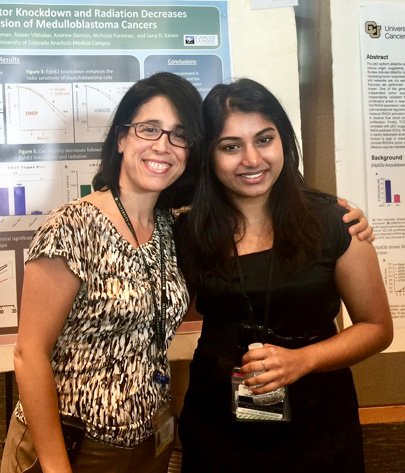MENTORSHIP FOR THE WIN
Sanjana Bukkapatnam’s path to become a physician-scientist
By Greg Glasgow
October 2022
Sanjana Bukkapatnam scored a victory in April when her paper on her glioblastoma research took first place in the National Poster Competition at the American College of Physicians Conference in Chicago.
The win was the culmination of six years of research and mentorship by Sana Karam, MD, PhD, a CU Cancer Center member and associate professor of radiation oncology, that began when Bukkapatnam was an undergraduate at CU Denver.
Bukkapatnam initially started working with Karam as part of the CU Cancer Center’s summer fellowship program for undergraduates. The relationship continued while Bukkapatnam earned her medical degree from the CU School of Medicine.
“I frequently refer to her as my second mother, because she really took me under her wing when I joined her lab,” Bukkapatnam says. “I was just this undergrad who had really big dreams but didn’t know where to go. She challenged me in ways that I needed to be challenged, and in ways that promoted my own self-growth.”
WORKING IN THE LAB
Working in Karam’s lab, Bukkapatnam began to study a receptor tyrosine kinase family involved in numerous malignancies. She became particularly interested in the role of the ligand ephrinB2 in glioblastoma. One prominent study had
demonstrated that it was a tumor suppressor, while another showed that it was an oncogene.

Sana Karam, MD, PhD, and Sanjana Bukkapatnam, MD. Bukkapatnam was a college student when began conducting research in Karam’s lab. Last spring, under Karam’s mentorship, Bukkapatnam, in her final year of medical school, won first place at the National Poster Competition at the American College of Physicians Conference.
Karam and Bukkapatnam worked on research that showed how ephrinB2 works with its receptor ephB4 to mediate downstream effects on invasion and proliferation in glioblastoma. Depending on the direction of signaling initiated, invasion and proliferation was either promoted or inhibited.
The research, which could contribute to future drug design, won Bukkapatnam first prize in the poster contest. Karam says the award is the result of Bukkapatnam’s work ethic and strong interest in research.
“It's also a matter of the persistence that she showed, coming in during winter break, during any school break, holidays, weekends,” Karam says. “She did a lot of the research as an undergrad for credit and nonpaid. She has such an incredible dedication to research. This young woman is going to go places; she’s going to go on to move needles for our patients.”
FROM BENCH TO BEDSIDE
Bukkapatnam became interested in medicine when she had a surgery at 8 years old and realized that “doctors are the people who take the pain away.” She was accepted to the CU School of Medicine, and she continued research she started as an undergraduate in Karam’s lab.
“She introduced me to the world of cancer biology and how to be a physician and do research simultaneously to provide the best outcomes for your patients,” Bukkapatnam says. “In medical school, as I was working with different oncologists during my rotations, it really solidified that this was where I needed to be, and this is the field that I wanted to pursue.”
Bukkapatnam graduated in May and is now an internal medicine resident at the University of Texas Health Science Center at Tyler, to be followed by a three-year oncology fellowship. She wants a career like Karam’s.
“I definitely want to practice clinical oncology,” Bukkapatnam says. “I absolutely adore the patients. I want a very strong clinical practice, but I also want to be involved in conducting cancer research as well. For me, it’s like two arms of the same thing. I couldn’t just do the clinical aspect, and I couldn't just do the research — I would want to do them together in order to provide the best care for my future patients. Sana has really shown me how you can do that in a very synergistic, beautiful, and seamless manner.”